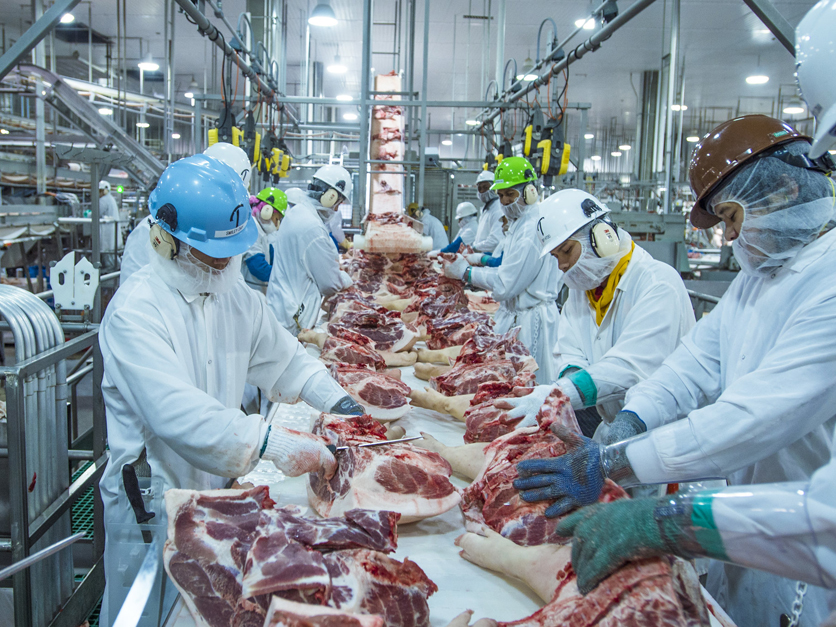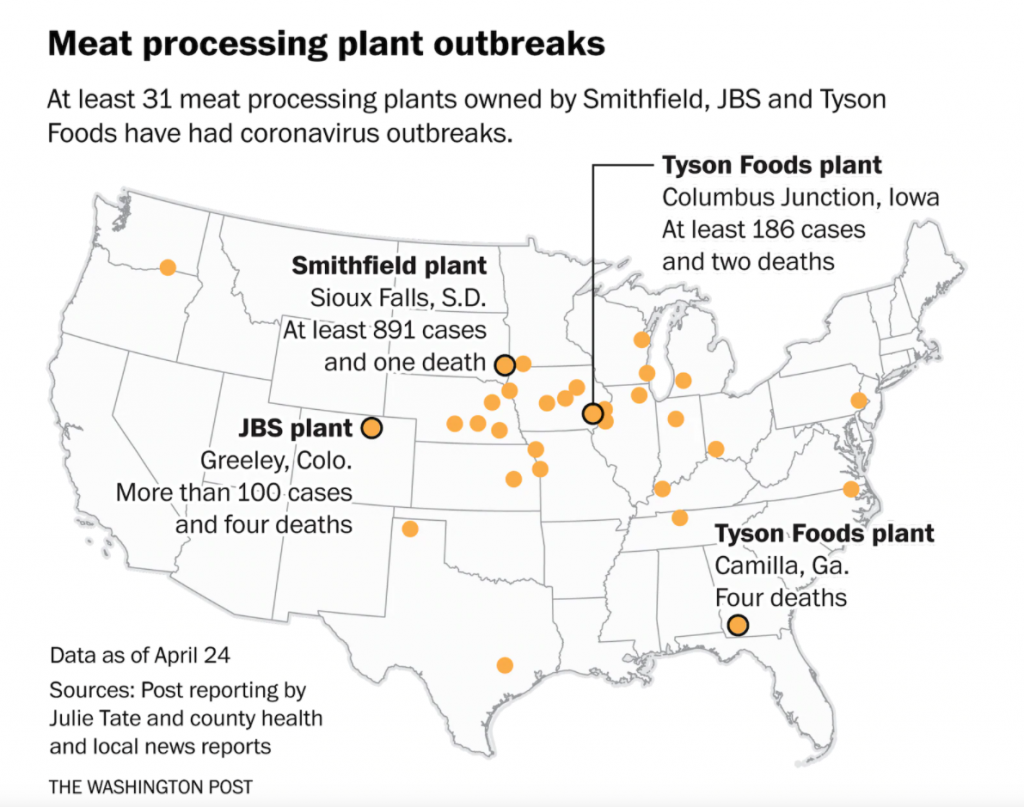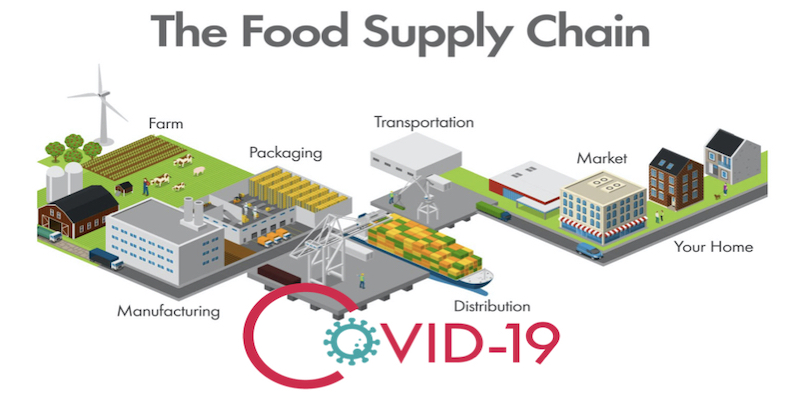Thanks to COVID-19, America’s food supply chain is in disarray and at the risk of total collapse.
Current Events
The word comes from the top executive of Tyson Foods, who says the coronavirus has wreaked so much havoc on the nation’s food supply chain that it’s only days away from being disrupted. Or, in other words, instead of being unable to find toilet paper and disinfecting wipes at the grocery store, shoppers may no longer be able to buy chicken, pork, beef, milk, and fresh produce by as soon as this weekend!

To demonstrate the dire severity of the issue, Tyson Foods chairman of the board John Tyson took out full-page ads Sunday in The New York Times, The Washington Post, and the Arkansas Democrat-Gazette to announce he was closing 2 pork processing plants in Indiana after “several” plant employees tested positive for COVID-19. The Tyson Foods closing was preceded by the shuttering of the Smithfield Foods plant in South Dakota and the JBS pork processing plant in Minnesota after employees in both plants were also found to have contracted the coronavirus.
“As pork, beef and chicken plants are being forced to close, even for short periods of time, millions of pounds of meat will disappear from the supply chain. As a result, there will be limited supply of our products available in grocery stores until we are able to reopen our facilities that are currently closed,” Tyson warned in his ad.
“We’ve just completed our third week of reduced slaughter and production. My guess is that about one week out, perhaps around May 1, shortages will begin developing at retail meat counters,” added livestock analyst Dennis Smith.

As if that wasn’t enough, the mass closings of restaurants, hotels, and schools have created a disastrous drop in demand for bulk food products which has resulted in a shocking waste emergency.
Farmers in Wisconsin and Ohio say they are having to dump 3.7 million gallons of milk each day into lagoons and manure pits and smash 750,000 unhatched eggs every week. Idaho farm owners have had to dig huge ditches to bury 1 million pounds of onions, while farms in South Florida (which supplies much of the Eastern half of the United States with produce) have been forced to plow perfectly ripe bean and cabbage fields back into the soil. All because they have too much supply and not enough demand.
Initially, the farmers donated most of the surplus to food banks and Meals on Wheels programs, however, they soon discovered charities just don’t have the refrigeration space or enough volunteer workers to absorb donations of this magnitude. Further, the cost of harvesting, processing, then transporting milk and produce to food banks had begun to put a financial strain on farmers who had already seen half their paying customers disappear.
.
Workers face real fear for their health and safety. As long as that’s true, current slaughter capacity will be limited. The cost of labor will rise, and eventually retail prices will, too. #tysonfoods 6/
— The Counter (@TheCounter) April 27, 2020
With meat processing plants preparing to completely shut down any day now in order to conduct mass cleanings and test employees for COVID-19, Donald Trump has stepped in with the Defense Production Act.
On Tuesday, Trump signed an executive order mandating slaughterhouses to continue to remain open and continue supplying America’s grocery stores. However, with 6,500 workers already sick with COVID-19 and in isolation, his move has set the stage for a showdown between the companies that process America’s meat and the unions and activists who want to protect workers during this deadly pandemic.
Unions see Trump’s move as a stunt to absolve meat companies of liability. Because of his order, companies will be able to keep plants operating no matter how many illnesses or deaths occur — and no employee could sue them. Additionally, any employee refusing to work could be fired.

Will meat processing companies remain open and force employees to work shoulder to shoulder with coworkers who have already tested positive or may be asymptomatic carriers of the coronavirus? Will companies defy Trump’s order and shutter anyway under pressure from its employee unions? Or, will thousands of meat processing employees simply stage a “sick-out” and refuse to report to work no matter what Trump or anyone says?
Since none of the above scenarios can fully rectify the problem, we are all now officially on notice. America’s food supply chain is at risk and could collapse any day now.







My apologies I deleted the wrong response. Let me try this again.
My apologies. I screwed up my 2nd response.
Thanks to COVID-19, America’s food supply chain is in disarray and at the risk of total collapse. […]-DJ
Bless you heart DJ. Okay I’ll be the one to bust Trump between the eyes. If I may, I’d like to modify your sentence just a little so that it reads:
Thanks to Trump’s rank incompetence, absolute depravity and total mishandling of COVID-19:
1. America’s food supply chain is in disarray and at the risk of total collapse. AND…..
2. We now have over 1 MILLION -that’s 1,000,000 – Confirmed cases of Coronavirus. AND……
3. More Americans have now DIED from Coronavirus than soldiers who died in over 10 yrs of fighting in the Vietnam War. The same war that the 5X DRAFT-dodging FAKE alpha ran from like a TERRIFIED rodent.
And now THIS…..the Executive order to keep meat-packing plants Open…..
[The five-page order is two-pronged. A senior administration official said earlier in the day, “from a (Defense Production Act) standpoint, it mandates that critical food supply operations stay open” and second, “from a liability standpoint, we will issue guidance coming from (the Department of Labor) that will provide additional liability protections.”
It was unclear what the liability protections might involve.] – ABC News April, 28, 2020
That right there tells you all you need to know about the so-called “ADDITIONAL liability protections.”
By all accounts NO actual “liability protections” were put in place to protect workers to begin with and that’s how the plants quickly became overrun with the virus in the first place.
So based on everything we’ve seen thus far I’d say whatever “liability protections are”issued” will be minimal at best AND voluntary based on “feasibility.” In other words hundreds of thousands of meat-packing workers are on their own.
If our food supply gets interrupted we are all screwed. What will people do for food? This is starting to become a horror movie that has no ending.
CNN:
Meat-processing plant workers are concerned about President Donald Trump’s executive order that compels plants to remain open during the coronavirus pandemic. Meat plant employees are among America’s most vulnerable workers, and some say they expect staff will refuse to come to work.
“All I know is, this is crazy to me, because I can’t see all these people going back into work,” said Donald, who works at Tyson’s Waterloo, Iowa, facility. “I don’t think people are going to go back in there.”
Donald asked to be referred to by his first name only. He is currently recovering after testing positive for the virus.
“I’m still trying to figure out: What is he going to do, force them to stay open? Force people to go to work?” he asked.
Which brings to mind another aspect of this very troubling story………….
How are WE (American consumers) supposed to trust meat that’s being processed in meat-packing plants teeming with Coronavirus by thousands of sick workers?!
The answer is plain. Trump and his corporate friends don’t give a d*mn. They are willing to risk the lives of millions of Americans all across this country for a dollar. If you get sick and die….oh well..! (shrugs)